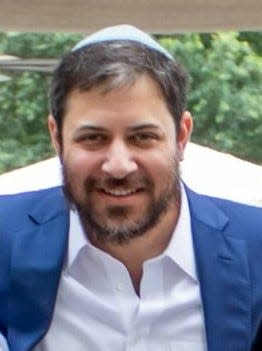Jacksonville rabbi: Jewish holiday of Shavuos a reminder of education's biggest points
The recent wave of protests and demonstrations at universities across the country have caused great distress and disturbance to many. As a campus rabbi, I am of course concerned for the welfare and safety of Jewish students who I serve daily. However, what is equally worrying is the distressing state of moral confusion in academia.
At best, many students perhaps don't fully understand the reason they’re demonstrating. At worst, many mistakenly believe they fight for a just cause when they align themselves with a terrorist organization.
These events, while often dominating news broadcasts and social media feeds, compel us to ask a broader question: What is the goal of higher education and education more broadly? Is it just about the pursuit of knowledge and acquisition of professional skills, or is it about something more?
The Torah’s view is that education is about much more than simply pursuing knowledge, downloading information or getting a good job. A key component to education is providing young people with a strong ethical foundation — a moral compass.
Occupational success is of course important, but without a moral education, people often lack a clarity of purpose and the ability to navigate the world effectively. What it boils down to is that being a good person — in Yiddish a mensch — is the foundation upon which everything else in life is built.
This was the vision of education championed by the Lubavitcher Rebbe, whose revolutionary approach and contributions to education are commemorated every year on Education and Sharing Day.
As former President Ronald Reagan proclaimed in 1985, “… to achieve its highest goals, education must be more than just a training in facts and figures, or even in basic skills, as important as they are. It must also include instruction in the deepest ethical values of our civilization.”
This sentiment has been echoed by subsequent presidents from both parties who continue to mark Education and Sharing Day annually.
Knowledge without character-building is not only a recipe for a distorted moral compass, but also for diminished emotional and interpersonal intelligence. This makes for a generation of people who feel less than fulfilled with their lives, if not outright depressed or lonely.
I often hear from students who might be succeeding academically, but feel confused about their direction or purpose in life. What’s truly sad is that many express being more lost after graduating than they did when they first enrolled.
Letters: Former Jaguars owner supports stadium deal as opportunity for 'real progress'
While some may say this is par for the course for young people, I believe we can do a much better job equipping them with meaning and purpose, which ultimately come from stronger ethics and morals. As they earn degrees and begin their careers, the questions of “What is it all for?” and “What am I here to accomplish?” need to be addressed to ensure their overall well being.
One of the Rebbe’s practical suggestions for implementing this ethical education is to give space for students to pause and quietly reflect on their mission and purpose. This non-sectarian initiative has been dubbed “moment of silence” and I am proud to have been involved in the effort to implement this moment in Florida schools.
The upcoming Jewish holiday of Shavuos, observed June 11-13, highlights all the above. This holiday commemorates the giving of the Torah, and is celebrated by families coming to the synagogue to hear the Ten Commandments read aloud. We refresh our moral compasses by receiving anew these timeless, universal laws like “Thou shalt not kill” and “Thou shalt not steal.”
It is our responsibility as parents and educators to impart these fundamental rules for living to the next generation. This will ensure they will have good character, a sense of moral clarity and purpose in life.

Rabbi Shmuli Novack directs the Chabad of Jacksonville Town Center with his wife, Chana. Learn more at SouthsideChabad.com/.
This guest column is the opinion of the author and does not necessarily represent the views of the Times-Union. We welcome a diversity of opinions.
This article originally appeared on Florida Times-Union: Parents, educators can do better job helping students find purpose